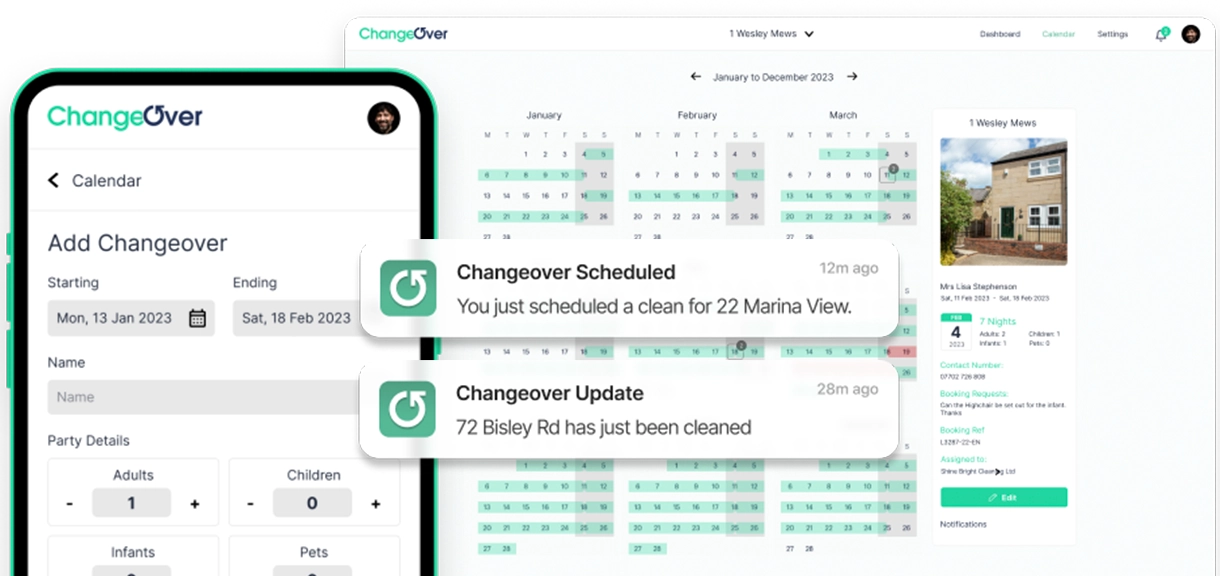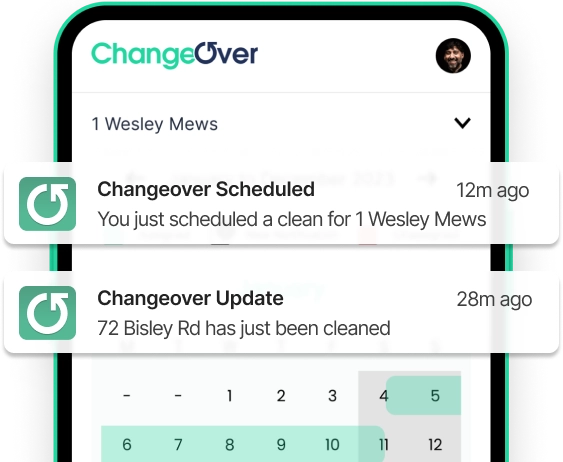Automate STR & Airbnb Cleaning
with our Easy-to-Use
Cleaning Service App
No more messy communications with your cleaner & worrying about missing a changeover!
Find out more
When it comes to the best platform for hosts, the comparison between Booking.com, Vrbo, and Airbnb is essential. Each platform offers distinct features and benefits that cater to different types of hosts and properties. Understanding the nuances of these vacation rental platforms is crucial for hosts to make informed decisions about where to list their properties and maximize their earnings. By examining the key differences between these platforms, hosts can align their hosting goals with the platform that best suits their unique needs and target audience.
For example, a host with a family-friendly vacation home may find Vrbo to be the most suitable platform due to its primary audience being families. On the other hand, a host seeking to attract a diverse range of guests, including budget-conscious travelers and luxury travelers, may find Airbnb’s diverse user base more appealing. Additionally, hosts aiming to tap into a global audience and list various types of accommodations may find Booking.com to be the best fit for their hosting requirements.
The scale and reach of each platform play a crucial role in influencing hosts’ decisions. Booking.com boasts an extensive database, with over 28 million accommodation listings across 223 countries, providing hosts with access to a global audience. Vrbo, with 2 million listings in 190 countries, positions itself as a platform for hosts looking to attract traveler’s seeking private vacation homes. Additionally, Airbnb offers over 7 million listings in 220 countries and regions, providing hosts with a diverse range of property types, including unique experiences, shared spaces, entire places, private rooms, and shared rooms.
Understanding the platform overview allows hosts to gain insights into the potential reach and exposure their properties can receive. For example, a host with a luxury villa in a popular tourist destination may benefit from listing on Booking.com to attract international traveler’s, while a host with a cozy family cabin in a scenic location may find Vrbo more suitable due to its focus on private vacation homes. Similarly, a host with a trendy urban apartment may leverage Airbnb’s diverse property types to attract millennials and traveler’s seeking unique experiences.
Furthermore, the diverse listings available on each platform enable hosts to tailor their offerings to different traveler preferences and budgets, offering flexibility in the type of accommodation they can list. This variety allows hosts to cater to different segments of the market and optimize their earning potential, emphasising the importance of understanding the platform overview in making informed hosting decisions.

The fee structures of vacation rental platforms significantly impact hosts’ earnings and financial considerations. Vrbo charges a 10-11% guest fee and provides hosts with the option to choose a yearly subscription of $499 or pay per booking, offering hosts flexibility in managing their expenses. In contrast, Airbnb charges a 10-14.2% guest fee along with a 3-5% host fee, requiring hosts to account for a percentage of the booking amount as well as a separate fee from their earnings. On the other hand, Booking.com does not impose a guest fee but has a 15% host fee and no credit card fee, affecting hosts’ net earnings from each booking.
Hosts should carefully consider their pricing strategy, property type, and target audience when evaluating the fee differences. For instance, hosts with high-value properties may find Vrbo’s fee structure more favorable due to the lower percentage, while those with budget-friendly accommodations may benefit from Airbnb’s relatively lower guest fees. Similarly, hosts with multiple properties can leverage the global presence of Booking.com to attract a broad range of travelers, while also utilizing Vrbo to target families or groups seeking private vacation homes.
Understanding these fee structures is crucial for hosts to make an informed decision based on their specific hosting circumstances and business objectives. Moreover, hosts should consider the impact of these fees on their overall earnings, as each platform’s fee structure can significantly influence the profitability of their vacation rental business, emphasizing the importance of a thorough understanding of the fee disparities among Booking.com, Vrbo, and Airbnb.
The cancellation policies offered by vacation rental platforms play a vital role in managing hosts’ risk exposure and safeguarding their properties. Vrbo stands out by providing up to $1 million in liability protection for hosts, offering an added layer of security and peace of mind for those who list their properties on the platform. This protection can be crucial in the event of unforeseen circumstances or damages caused by guests during their stay. For hosts who prioritize risk management and protection, Vrbo’s liability coverage can be a significant advantage, especially for those who host high-value properties or have concerns about potential damages.
Airbnb offers a range of flexible cancellation policies, including flexible, moderate, strict, long-term, and super strict options for hosts. This variety allows hosts to tailor their cancellation policies to their specific needs and risk tolerance. For instance, hosts who want to offer more flexibility to guests may opt for the flexible cancellation policy, while those who prefer more protection against last-minute cancellations may choose the strict or super strict options. The ability to customize cancellation policies on Airbnb can be a valuable tool for hosts to attract and retain guests while managing their own risk exposure.
Booking.com takes a different approach by offering fully flexible, customized, and pre-authorized/deposit options to hosts, providing hosts with the freedom to set cancellation terms that best suit their property, target audience, and overall hosting strategy. This tailored approach can be beneficial for hosts who want to have more control over their cancellation policies and adapt them to different scenarios or seasons, ultimately enhancing the hosting experience for both hosts and guests.
Understanding the various cancellation policies and the level of protection they offer is crucial for hosts to make informed decisions about where to list their properties. By carefully evaluating the cancellation options provided by Vrbo, Airbnb, and Booking.com, hosts can align their property management approach with the platform that best meets their risk tolerance and business needs, ultimately ensuring a positive hosting experience for both hosts and guests.
Host protection is a critical consideration for hosts looking to safeguard their investments and minimize potential financial losses. Airbnb provides up to $1 million with the Host Guarantee, which protects hosts against damage to their property caused by guests. This coverage can be reassuring for hosts who want peace of mind when renting out their properties. On the other hand, Vrbo offers liability coverage included, as well as insurance packages for guest damages, providing hosts with a comprehensive level of protection against potential property damage and guest-related liabilities.
In contrast, Booking.com does not offer protection from guest damages, meaning that hosts who list their properties on the platform may need to rely on their own insurance policies to cover any damages caused by guests. This lack of protection could be a concern for hosts who prioritize security and financial safeguards when renting out their properties. It’s important for hosts to carefully consider the level of protection offered by each platform and weigh it against their own risk tolerance and insurance coverage to make an informed decision about where to list their properties.
Furthermore, understanding the nuances of host protection on Airbnb, Vrbo, and Booking.com is essential for hosts to mitigate potential risks and ensure that their properties are adequately covered in the event of damages or unforeseen incidents. By gaining insights into the level of protection provided by each platform, hosts can make informed decisions about where to list their properties, ultimately safeguarding their investments and ensuring a secure hosting experience for both hosts and guests.

The target audience and property types catered to by each platform significantly influence hosts’ decisions about where to list their properties. Vrbo’s primary audience is families, making it an attractive platform for hosts with vacation homes and properties tailored to family-friendly experiences. This distinctive focus on families allows hosts to tailor their property listings to accommodate larger groups, emphasize family-friendly amenities, and highlight nearby attractions suitable for families. Additionally, Vrbo’s emphasis on entire private homes caters to the desire of families for a more secluded and intimate vacation experience, providing a sense of privacy and comfort during their stay.
On the other hand, Airbnb’s primary users are millennials reflecting the platform’s appeal to a diverse range of travelers seeking unique experiences and varied accommodation options. Hosts can leverage Airbnb’s diverse property types, including entire places, private rooms, and shared rooms, to attract millennials and travelers seeking budget-friendly accommodations. Furthermore, Airbnb’s focus on unique experiences and local recommendations aligns with the preferences and lifestyle of this specific group of users, offering hosts the opportunity to showcase trendy and unique accommodations that resonate with the millennial demographic.
Booking.com’s strong presence with European customers allows hosts to tap into a wide array of traveler preferences and accommodation types, making it an attractive platform for hosts with diverse property portfolios. The inclusivity of various types of listings, such as vacation rental homes, hotel rooms, and private rooms in a shared home, showcases Booking.com’s commitment to accommodating a wide range of traveler preferences, offering hosts the flexibility to list various property types and cater to different segments of the market.
Understanding the distinct target audiences of Vrbo, Airbnb, and Booking.com is critical for hosts to tailor their property listings and marketing strategies to align with the platform that best suits their property type and target audience. By leveraging the unique features and audience preferences of each platform, hosts can optimize their property’s visibility and appeal to the right demographic, ultimately driving higher occupancy rates and increasing their earnings.
No more messy communications with your cleaner & worrying about missing a changeover!
Find out more
The potential income and review submission timelines on each platform provide valuable insights for hosts to gauge their earning potential and guest satisfaction. Vrbo’s average income for hosts is $33,000 per year, reflecting the platform’s appeal to families and older, affluent travelers who may be willing to spend more on vacation rentals compared to the budget-conscious travelers that Airbnb tends to attract. This substantial difference in potential income highlights the platform’s unique positioning and its potential to generate higher earnings for hosts with properties tailored to family-friendly experiences.
Moreover, Vrbo allows guests and hosts a generous one-year period to submit their reviews, providing hosts with a comprehensive and reflective feedback from guests over time, giving hosts a better understanding of their property’s performance and areas for improvement. This extended review period can offer hosts valuable insights into guest satisfaction and property performance, allowing them to make informed adjustments and enhancements to their properties to ensure a positive guest experience.
In contrast, Airbnb’s shorter 14-day review period and star ratings system might offer hosts more immediate and concise feedback, which could be beneficial for making quick adjustments and improvements to enhance the guest experience. Additionally, Booking.com sends guests an invitation to review the property just 2 days after check-out, allowing for relatively prompt feedback that could be valuable for hosts in terms of gauging guest satisfaction and making timely adjustments to their property or services.
Understanding the differences in potential income and review submission timelines across Vrbo, Airbnb, and Booking.com is essential for hosts to assess their earning potential and guest feedback management. By gaining insights into the income potential and review processes on each platform, hosts can make informed decisions about where to list their properties, ultimately ensuring that they can maximize their earnings and provide exceptional guest experiences.

Hosts can implement various strategies to maximize their earnings and ensure exceptional guest satisfaction across Booking.com, Vrbo, and Airbnb. For instance, hosts can tailor their property listings and marketing efforts to align with the platform’s target audience and unique features. By understanding the distinct user demographics and preferences of each platform, hosts can customize their property descriptions, amenities, and pricing to appeal to the right demographic, ultimately driving higher occupancy rates and earnings. Additionally, leveraging the unique features and audience preferences of each platform can help hosts optimize their property’s visibility and appeal to the right demographic, ensuring a positive guest experience and repeat bookings.
Furthermore, maintaining high levels of guest satisfaction is crucial for garnering positive reviews and repeat bookings. Hosts can achieve this by ensuring top-notch cleanliness, promptly addressing guest inquiries and concerns, and offering personalized touches or amenities to enhance the guest experience. Leveraging the review feedback received from previous guests can also provide valuable insights into areas for improvement and help hosts make necessary adjustments to enhance guest satisfaction. By consistently delivering exceptional service and memorable experiences, hosts can cultivate a positive reputation, boost their property’s visibility, and ultimately drive higher occupancy rates and earnings on Booking.com, Vrbo, and Airbnb.
Moreover, hosts can strategically adjust their pricing based on the demand and local events in their area, accommodating the diverse preferences of travelers and maximizing their property’s earnings. For example, during peak travel seasons or major events, hosts can increase their rates to capitalize on the higher demand, while offering competitive pricing during off-peak periods can attract more guests and boost occupancy rates. Additionally, providing special promotions, discounts for longer stays, and inclusive packages can also entice guests and enhance overall earnings. By customizing the pricing strategy to align with the target audience and local market trends, hosts can effectively maximize their revenue and occupancy rates across different platforms.
In addition, leveraging vacation rental software like iGMS for managing multiple listings smoothly is suggested, providing hosts with the tools and capabilities to streamline their property management, communication, and guest experience. By implementing these strategies and leveraging the unique features of each platform, hosts can optimize their earnings and ensure exceptional guest satisfaction across Booking.com, Vrbo, and Airbnb, ultimately driving higher occupancy rates and enhancing their property’s reputation.
In conclusion, the comparison of Booking.com, Vrbo, and Airbnb for hosts reveals the unique features and benefits offered by each platform. Understanding the platform overview, fee structures, cancellation policies, host protection, target audience, potential income, review processes, multi-channel distribution, and tips for maximizing earnings and guest satisfaction is crucial for hosts to make informed decisions about where to list their properties.
By carefully evaluating the differences and nuances of each platform, hosts can align their hosting goals with the platform that best suits their unique needs and target audience, ultimately ensuring a positive hosting experience and maximizing their earnings. Whether it’s targeting families with a private vacation home, attracting millennials with unique experiences, or tapping into a global audience with diverse property types, hosts can leverage the distinct features and reach of Booking.com, Vrbo, and Airbnb to optimize their property’s visibility, appeal to the right demographic, and drive higher occupancy rates and earnings.
Changeover is a clever platform that shares your booking calendar with your cleaners & then fully automates the scheduling & management of changeovers. Sit back & relax as it tracks progress & sends notifications to ensure that everything is completed smoothly & on time.
Make changeovers simple & stress-free. In a few clicks, you can auto-schedule, share & track cleaning with ease.
Find out more
In today's digital age, managing a short-term rental or Airbnb hosting business can be made significantly easier and more efficient...
Read article..Keep in touch & be one of the first to try
Changeover for free!
PS. As a thank you we've put together the ultimate STR & Airbnb cleaning checklist that we'll send you completely free!
Keep in touch & be one of the first to try
Changeover for free!
PS. As a thank you we've put together the ultimate STR & Airbnb cleaning checklist that we'll send you completely free!